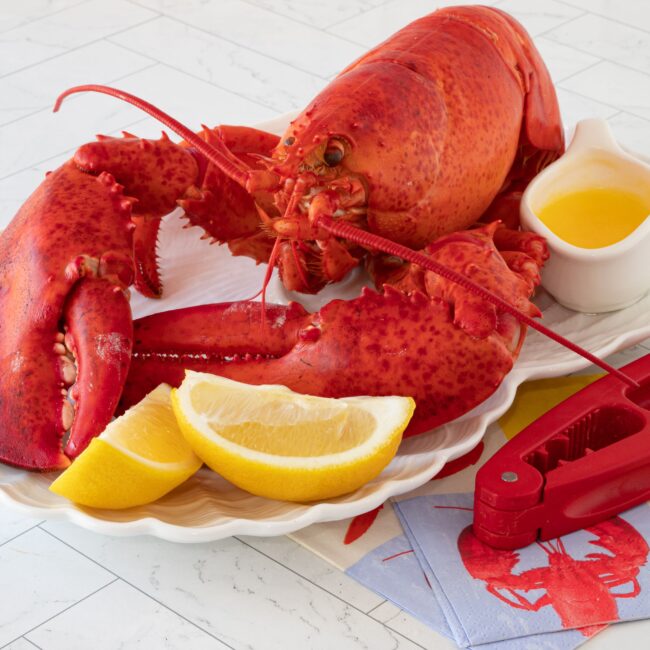
Rock Lobster Industry fighting for survival
Australia’s rock lobster fishing industry is facing a struggle for survival after it lost its key export market of China.
China accounted for 95 per cent of rock lobster exports that were flown live from Australia. But last November Beijing imposed a live export ban as relations with Canberra plummeted.
The industry, became caught in rising tensions with China.
Before the trade sanction hit, Chinese buyers were prepared to pay about $100 per kilo for high-grade Australian southern rock lobster.
But today rock fishers are largely dependent on the domestic market, where prices fetch only about $30 per kilo. We caught up with one of the industry leaders.
Interview with – Jonathon Davey. Executive Director at Seafood Industry Victoria.
How’s things? What’s happening? Are you getting back on track?
Oh look, yeah we are. China obviously is still looking pretty dull and pretty ordinary but the feedback is that it’s going to be more along the terms of a long recovery piece.
This is, of course, a direct result of China’s import ban on Australian live lobster, cutting out a market that previously accounted for more than 90% of the country’s rock lobster trade. Local lobster prices are expected to hike somewhat in the lead-up to Christmas, but it will not reach anywhere near the usual holiday prices. Especially if trade tensions continue in the new year.


Are you clearer now on what it all means- the China situation?
To be honest, no. In terms of the dust settling, we’re looking at what new markets are available and how we fend for the local market so we’re putting our focus into that at the moment. That’s what the industry wants, to be able to have access to fresh local seafood for Christmas and other celebrations as well. It’s always been there but in small numbers but now we’ve got whole lobsters retailing in Victoria for between 60 – 70 dollars per kilo which is amazing. People need to get together and celebrate and buy up.

In terms of the impact on the industry, we’re looking at job losses? Are we looking at financial impacts as a result of the fallout?
I think it’s too early to tell. We’ve been riding a wave of Covid which thankfully hasn’t seen too many job losses but this one, it will entirely depend on how market development goes, how quickly we can get that stuff up and running towards bringing the product in. So, we’ve still got boats that are tied up, people are still sitting on the wharf. Essentially some of them have looked towards getting involved in other fisheries and still within the industry, still making a living but not doing rock lobsters as they always have.
We have a processing issue, and we are trying to pivot and fix it as fast as we can, so we can get our lobsters onto Australian family tables in time for Christmas.
Our major supermarkets account for 60 percent of at-home seafood consumption sales. As drivers of volume, we’d love to hear from them about how they can help us get more Aussie lobsters onto tables.
In terms of what actually happens, are you still sending lobsters there and copping their margin increase? How does that work? Or have you stopped sending stuff there?
My understanding is that there are no lobsters going into China at all. The last product going in there met with uncertainty on the borders so there’s no product going.
So, if product was to go in there now, and they applied their margin increase, what would happen? It’s just economic is it?
To be honest I don’t actually know. I haven’t been in any of those discussions where they’ve mapped that sort of stuff out.
Is there anything that can be done by way of counter measure to redress the situation and sort it out with China?
The federal government is focused on solving the issue. The reports of difficulty of accessing goods in China are of concern to us and the government is continuing to seek clarity from Chinese authorities – both here in Australia. There has been a consistent denial of any targeting of Australian products and a commitment spoken of in relation to observation of the trade rules.
However, it’s a discussion for the Government really. We’ve put what we need and how we need to work with them moving forward and how we need both Victorian and Federal support and they’re giving us that. It’s just a matter of waiting to see what’s going on but at the same time, I’m trying to make sure that our lobsters have a market that they can be sold in which is, right at this point in time, the local market.
What specifically have you asked the Government to do – both Federal and State?
They’re giving us good support and looking at promoting and establishing an online seafood trading platform in the new year, hopefully. We’re looking towards communication pieces in the lead up to Christmas and other occasions for people to buy local. Those are the sort of measures that we’re working on and have been well received.
What do you specifically want the Govt to do in relation to the China situation?
There’s a suite of things. Much of it focuses on the communication side of things, the ongoing support for the industry, working through a rollover of quota if we can’t catch it, it’s those sorts of things really, that seem to be progressing quite well in discussions with the Govt.
So the Govt is being supportive of you?
Yeah most definitely.
Do you guys blame them for being in this situation? Or who do you blame?
I don’t know that we put blame on anyone to be honest.
It must be frustrating though for fisherman to be in this situation with what was once a really lucrative market?
Yeah, it’s certainly frustrating but then again, you know as you unpack it, we’re still working through it and we can’t really blame it on any one person.
So, what are the plans for the industry going forward?
As I said before, we’re looking to develop an online seafood trading platform. We’re working on putting a case together to try to promote local as much as possible. Hopefully this is the best way we can support our local industry.
.Who will fill the hole in China that’s left as a result of our product not going in there?
At the moment they’re just taking all of the southern rock lobsters from New Zealand but there are many types of lobsters. Everyone produces a lobster of some type. It’s just a matter of how that gets recognized as the quality product that they demand and want on their tables.
It must be annoying that all the work you guys have done in terms of servicing the Chinese market to see it being taken over by others now?
Yeah, I think the most annoying thing is that over the years the industry has built up relationships with importers and the consumer in China and now we just have no way of getting the product to them. Those long-term relationships where we’re still committed to them and looking forward to when we can get back in there. It looks like it could take some time and we just don’t know when that will happen.
Apart from the local market here, have you guys been looking for alternative markets as well?
That’s been progressed through the national seafood trade advisory group, not through me. I have no idea to be honest.


Leave a Reply